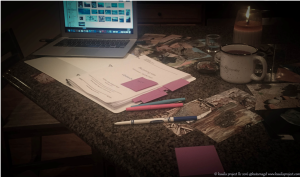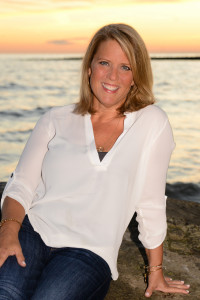From time to time in this space, Balboa Press publishes articles written by our authors in which they share some aspect of their self-publishing journeys. These are the words of Kate Nagel, author of Untethered and Becoming Kate. For more information about Kate, check out her website, Facebook, Twitter, LinkedIn, Pinterest and Instagram. For a sneak peek of Becoming Kate, click here. Download the Balboa Press free publishing guide to receive more information on self-publishing your book with Balboa Press.
This is part two of a blog series by Kate Nagel. Check out her first blog “Writing the First Draft of Your Memoir”.
We met at a local restaurant, during that quiet time between the lunch and dinner rush. We each placed our copies of the manuscript on the table. Mine was clean and unmarked. Hers was not, and I imagined her ideas and thoughts about my manuscript were reflected through notes and redlines, as well as the Post-its® I could see attached to pages that probably needed some extra attention. She started the conversation with, “I had a horrible nightmare last night.” I asked her what it was about and she replied, “I dreamt that you got very angry with me as we were reviewing my edits.”
The voices in my head immediately chimed in.  They weren’t angry, they were afraid. “She hated it. It’s not good enough. I am going to have to re-write it.” I paused and realized that even if all of those things were true, that was exactly what I needed to know. I had asked her opinion when I asked her to be my editor. I trusted her from the moment we first met, and it was time to hear what she had to say. She wasn’t the enemy, she was my guide, ready to help me tell a better story. I took a deep breath, told the voices to simmer down, and assured her, “You are here to help me. I won’t get angry. I promise.”
They weren’t angry, they were afraid. “She hated it. It’s not good enough. I am going to have to re-write it.” I paused and realized that even if all of those things were true, that was exactly what I needed to know. I had asked her opinion when I asked her to be my editor. I trusted her from the moment we first met, and it was time to hear what she had to say. She wasn’t the enemy, she was my guide, ready to help me tell a better story. I took a deep breath, told the voices to simmer down, and assured her, “You are here to help me. I won’t get angry. I promise.”
To me, writing the first draft of a book is largely a private experience. It’s my time to explore ideas, be surprised by what my creativity conjures, and experience my heart’s deepest feelings as I reach for the words to express them. Once it’s all there, it’s time to take a big leap and let it go.
The relationship between an editor and writer is personal as well as professional, and it’s grounded in mutual trust and respect. I am making myself vulnerable and exposing my imperfections as a writer; I am trusting someone to help me to find the inconsistencies and disconnections with my plot lines and themes.
We opened our respective copies and started in. There were about six sessions in all. We worked from her notes as my blank copy slowly filled with the collective ideas, red lines, and comments we agreed to along the way. She believed in my ability to tell the story, and I envied her perspective as the editor. She was seeing the story in a way I couldn’t – through a completely different lens. I came to each  session not fearful or protective about my work, but more curious about what she had found in my words, paragraphs, and chapters. She challenged me to be a better writer as she showed me opportunities to expand or contract ideas and content to add strength to the message. Some sections moved quickly and others required more thought and attention. There were a few spots where she asked me to sit with a section, and then, dig a little deeper into my heart as I brought the more difficult words to the page.
session not fearful or protective about my work, but more curious about what she had found in my words, paragraphs, and chapters. She challenged me to be a better writer as she showed me opportunities to expand or contract ideas and content to add strength to the message. Some sections moved quickly and others required more thought and attention. There were a few spots where she asked me to sit with a section, and then, dig a little deeper into my heart as I brought the more difficult words to the page.
After our last session, I sat down, poured a glass of wine, and reviewed our collective work. There was a stronger story emerging from the many red marks, notations and Post-its® attached to some pages that needed a little extra attention. The editing process took my story a little further away from me and a little closer to the reader.
The better editing experiences (in my opinion) are iterative and interactive; we agree to be open and willing listeners. There is no room for ego and there are no bad ideas. Every constructive comment is not a judgment, rather, an opportunity for improvement. The red ink is not about always about grammatical errors – of which there will always be. Rather, it’s an opportunity to strengthen and develop the story- and the writer.
Balboa Press authors who’d like to share a 350-600 word experience related to the self-publishing of their books, are invited to do so by sending a message through our Facebook page at www.facebook.com/BalboaPress, by tweeting us @BalboaPress, or by emailing blog@ balboapress.com. We may not be able to use every story, but we will read and consider them. Balboa Press reserves the right to edit stories for content, grammar and punctuation accuracy; as well as for space.
Pingback: The Short Game by Kate Nagel - Balboa Press Publishing Blog